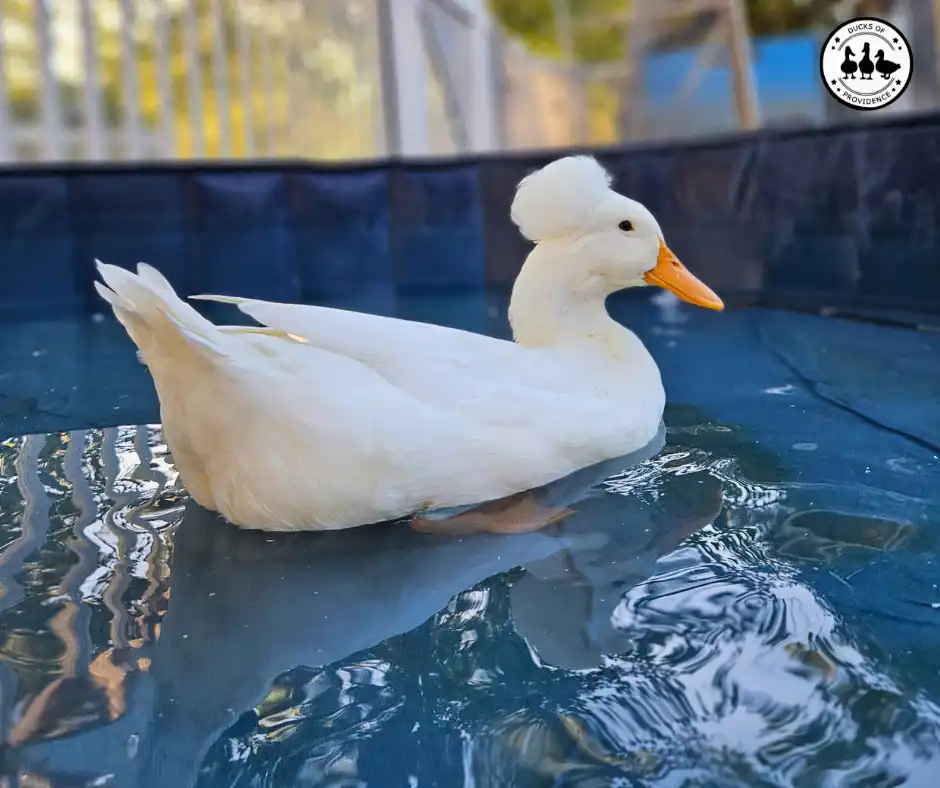
Keeping Ducks Cool During the Hottest Months – Effective Tips to Beat the Heat
Last updated: January 15th, 2026
Hello, fellow duck enthusiasts! Summer is upon us, and while we humans might enjoy bathing in the sun and sipping on cool beverages, our feathered friends can find the heat a bit overwhelming. Even with their resilience, ducks appreciate our help to stay cool and comfortable during the hot summer months. Let’s dive into some quacktastic tips to keep your ducks cool and happy this summer!
Ducks of Providence is free, thanks to reader support! Ads and affiliate links help us cover costs—if you shop through our links, we may earn a small commission at no extra cost to you. Thanks for helping keep our content free and our ducks happy! 🦆 Learn more
Provide Plenty of Fresh Water
Water is essential for ducks, not just for drinking but also for cooling off. Ensure that your ducks always have access to clean, fresh water. Here are some ways to make it extra refreshing:
- Shallow Pools: Set up shallow kiddie pools or tubs where ducks can wade and splash around. Ducks love water, and a dip in a pool can help them regulate their body temperature.
- Ice Cubes: On particularly hot days, add ice cubes to their water. Watching ducks play with ice cubes is both entertaining and effective in keeping them cool.
- Electrolytes: Adding electrolytes to their water can help prevent dehydration and heat stress.
- Water Pads: Create water pads using shallow trays filled with water. Ducks can walk through and splash around, enjoying the cool water on their feet.
- Splash Pads: Ducks enjoy playing with splash pads as much as little kids or other pets.
- Misters: Install misters around their enclosure to create a fine mist. Ducks enjoy the gentle spray, which helps them stay cool.
- Sprinklers: Set up a sprinkler in their pen, maybe on a timer, so they periodically get a spontaneous ‘rain shower.’ This will delight your ducks, cool the air down, and keep the ground moist, helping to entertain and cool your ducks on hot summer days.
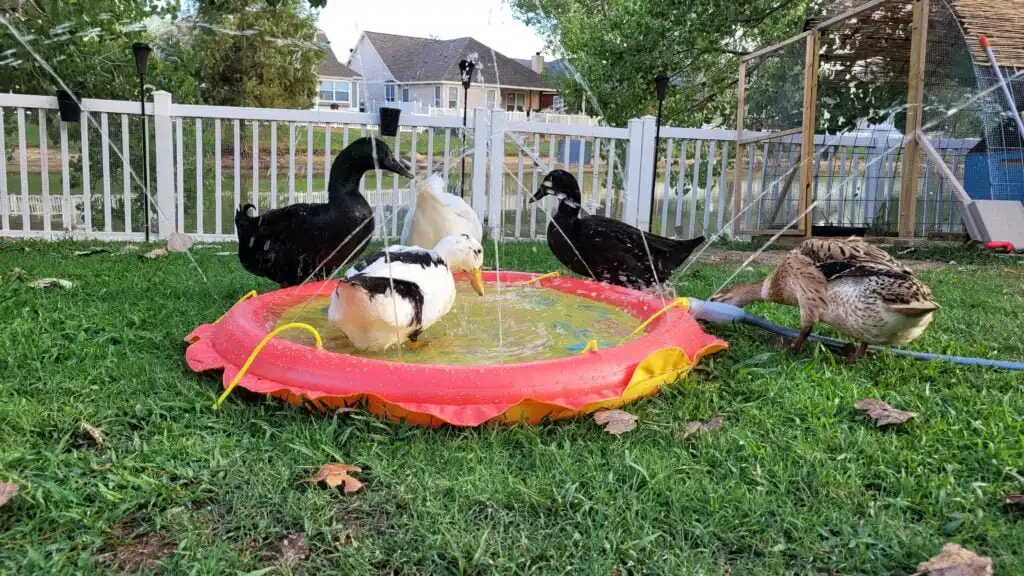
Regularly Change Water
To keep your ducks cool and healthy, regularly change their water with fresh, cool water. Stagnant water can heat up quickly and become less refreshing, so keep it clean and cool throughout the day.
Ensure 24/7 Water Access
Ducks should always have access to water, day and night. Water is crucial for their drinking, overall well-being, and cooling. Make sure their water containers are always filled with clean, fresh water.
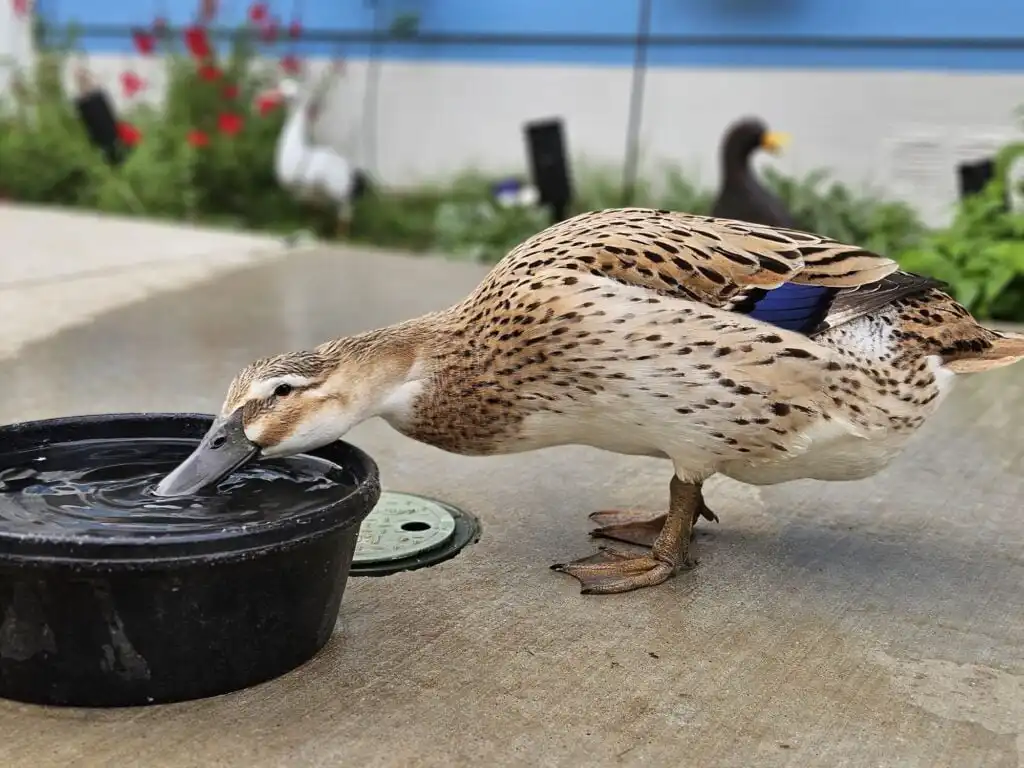
Offer Shade and Shelter
Just like us, ducks need a shady retreat to escape the sun’s harsh rays. Make sure their living area includes ample shaded spots. Here’s how you can create the perfect cool haven:
- Natural Shade: Plant trees or large shrubs around their enclosure. These provide shade and enhance the environment.
- Artificial Shade: Use tarps, shade cloths, reed fencing, or even umbrellas to create shaded areas. Ensure these structures are secure and won’t blow away in the wind.
Cool Treats for Hot Days
Who doesn’t love a cool treat on a hot day? Ducks are no exception. Treat your ducks to some refreshing snacks:
- Frozen Veggies: Freeze peas, corn, or chopped vegetables in water to create ice veggie cubes. Ducks will enjoy pecking at the frozen treats, staying cool and hydrated.
- Chilled Fruits: Offer cold watermelon, cucumber slices, or berries. These hydrating fruits are perfect for a hot day and are a big hit with ducks.
- Water-laden Treats: Provide treats high in water content to help keep your ducks hydrated and cool.
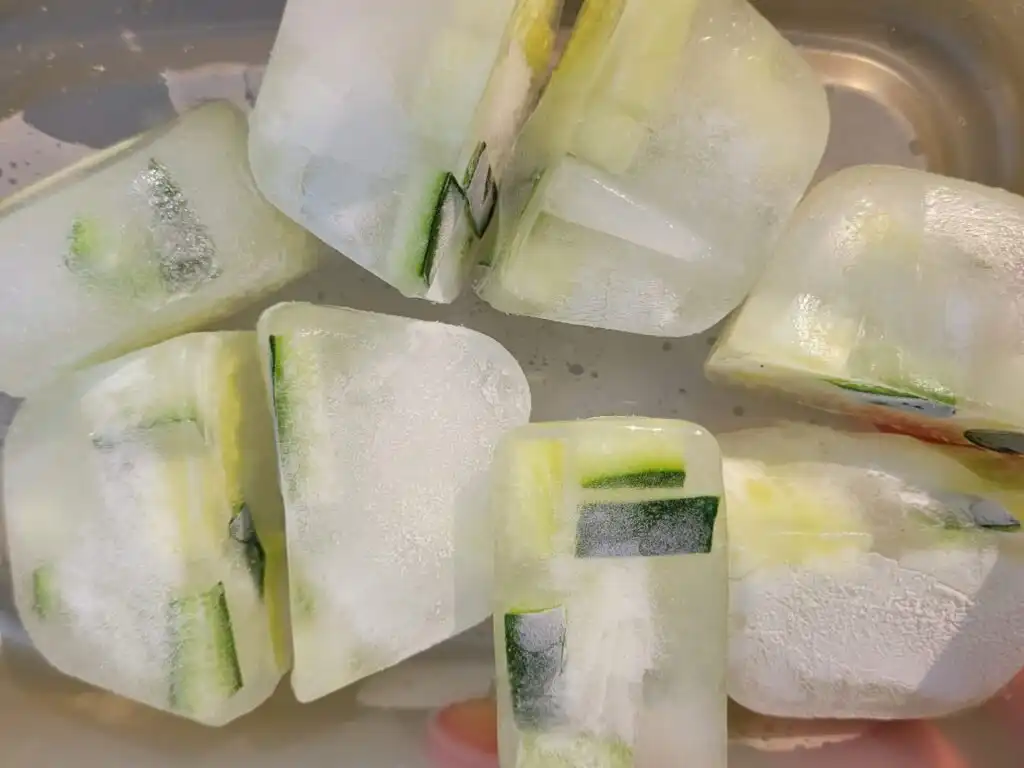
Proper Ventilation and Climate Control in the Duck House
Good ventilation in the duck house is crucial during summer. Stagnant air can make the heat feel even worse. Here’s how to ensure your duck house stays breezy:
- Windows and Vents: Install windows and vents to promote air circulation. Cover openings with mesh to keep out predators while allowing fresh air to flow through.
- Fans: In extreme heat, consider using fans to circulate air in and around the duck house. Ensure the fans are safe and positioned where ducks can’t get too close.
- Air Conditioner: If possible, install an air conditioner in their coop to keep the temperature down. Ensure it’s set to a safe level for your ducks.
- Indoor Time: On extremely hot days, consider bringing your ducks indoors to cool off in an air-conditioned environment.
Proper Ventilation and Climate Control in the Run
The duck run also needs good ventilation to keep your ducks comfortable. Here are some tips:
- Fans: Install fans in the run to keep the air moving and provide a breeze. Make sure the fans are secure and out of reach of the ducks. We love to use a box fan.
- Shady Areas: Create plenty of shaded spots in the run using natural or artificial means.
- Misting Systems: Set up a gentle misting system or use a hose with a mist attachment to lightly spray the area during the hottest parts of the day. Ducks love walking through the mist, and it helps cool down the surrounding air.
- Frozen Treats: Offer frozen peas, corn, or chopped fruits like watermelon. You can also freeze their favorite snacks into ice blocks for extra fun and hydration.
- Cool Water Baths: Provide shallow tubs or kiddie pools with fresh, cool water and refresh them throughout the day. Adding ice to their bathing water can give quick relief from the heat.
- Chilled Water Bowls: Keep their drinking water cool by placing it in the shade and adding a few ice cubes. Refill often to ensure it stays fresh.
- Ground Cover: Avoid heat-retaining surfaces like concrete. Instead, use grass, dirt, or pet-safe artificial turf that stays cooler underfoot.
- Adjust Routine: Let your ducks out earlier in the morning and bring them in after sunset to avoid peak heat hours. Limit handling and other stressors during the hottest part of the day.
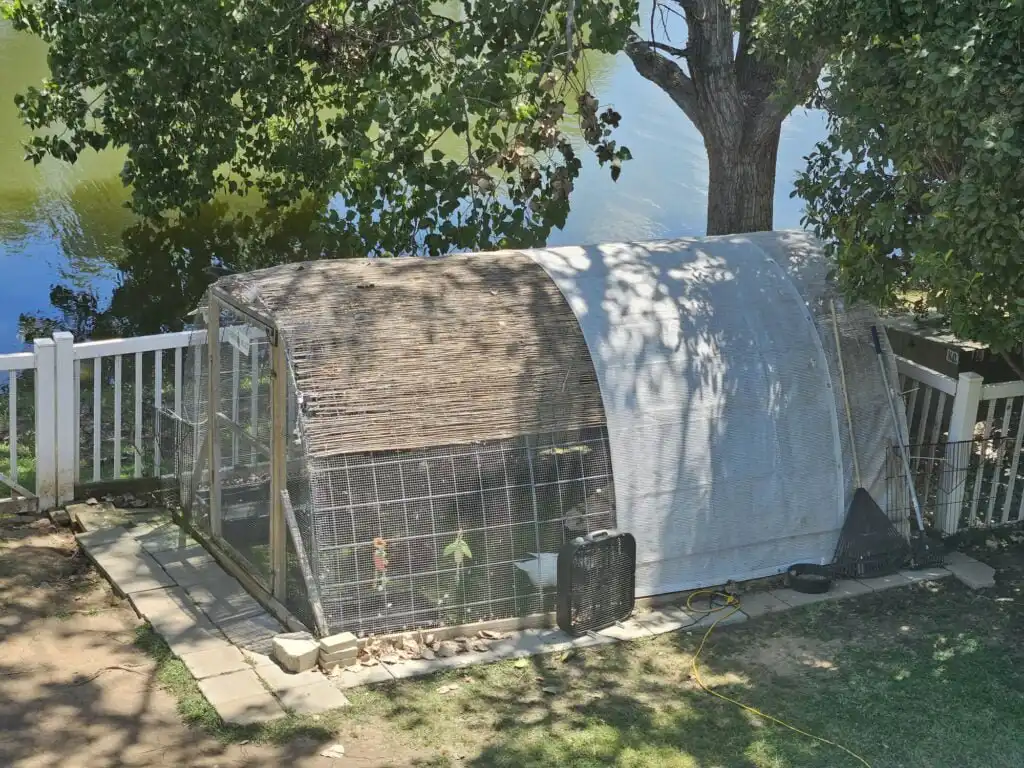
Feeding Adjustments
You will most likely notice your ducks eating far less feed during the summer. This is completely normal. Try feeding them first thing in the morning and then just before you lock them up for the night, or even leave them fed and water overnight so they can eat when it’s cooler. This ensures they get the nutrition they need without overheating.
Monitor Their Health
Keep an eye on your ducks for any signs of heat stress. Ducks can easily handle temperatures up to around 80-85°F (27-29°C), but anything higher can start to become dangerous. Especially when the temperatures climb beyond 90°F (32°C) or even 100°F (38°C). Symptoms of heat stress include:
- Panting: Ducks will pant to try and cool down.
- Lethargy: They may become unusually tired and slow.
- Drooping Wings: Ducks will hold their wings away from their bodies to try and dissipate heat.
If you notice any of these signs, take action immediately:
- Move to a Cooler Area: Relocate ducks showing signs of heat stress to a cooler, shaded area.
- Hydration: Ensure they drink plenty of water. You might need to gently encourage them if they’re too tired to drink.
- Electrolytes: Adding electrolytes to their water can help prevent dehydration and heat stress. Good Electrolytes for ducks are Sav-A-Chick Electrolyte & Vitamin Supplement, Hydro-Hen, or VitaMetz.
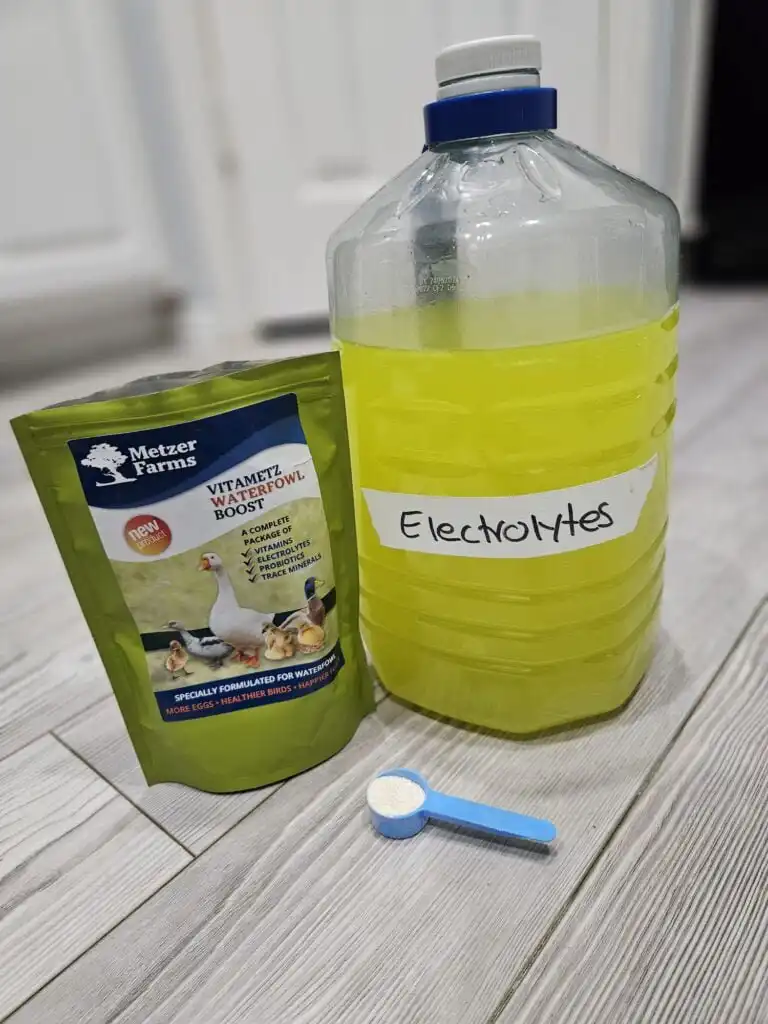
Outdoor Night Pen
You might be tempted to leave your ducks out overnight in the pen or run where it’s cooler, but if you do, be sure your pen is predator-proof. Ducks are vulnerable to nocturnal predators, so ensuring their safety is crucial if they stay outside. Read more on how to predator-proof your pen in our article How to keep ducks safe from predators?
Maintain a Clean Environment
A clean living environment is essential year-round, but especially in summer when bacteria and parasites thrive in the heat. Regularly clean their water sources, refresh bedding, and remove any soiled material to prevent illness.
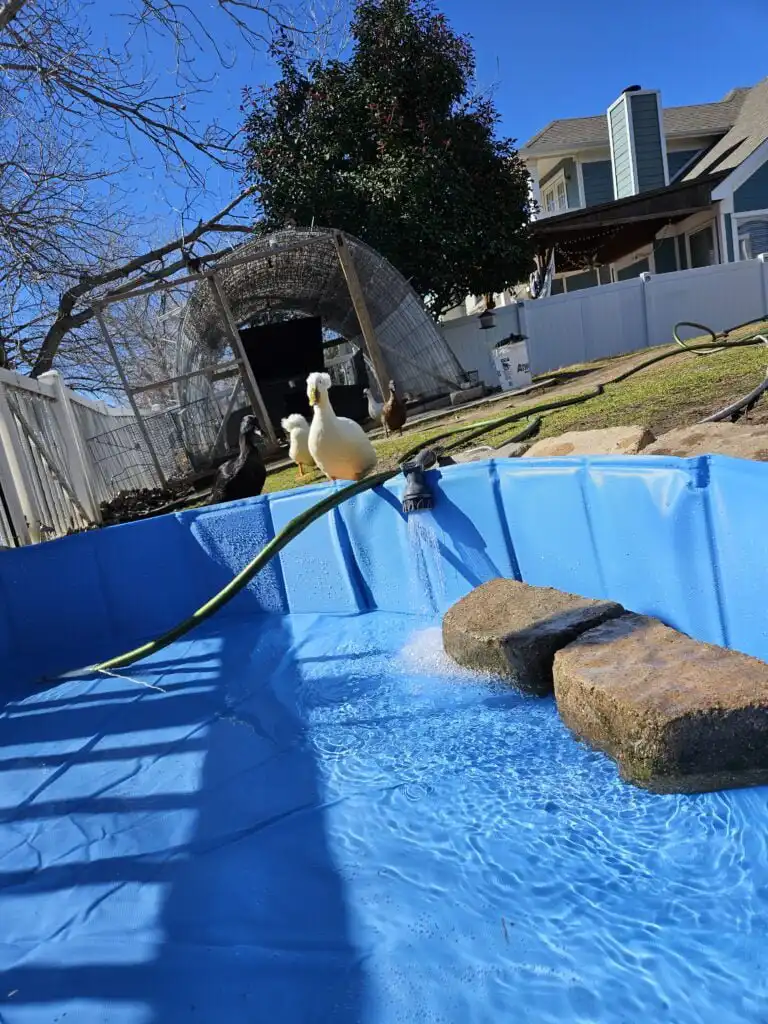
How Ducks Regulate Their Temperature
Ducks have several natural mechanisms to help regulate their body temperature:
- Panting: Ducks will pant to help cool down, much like dogs do. This helps them release heat from their bodies. Panting increases evaporative cooling from their respiratory tract.
- Splashing Water: Ducks will often splash water onto their bodies to cool off. Access to water is essential for this behavior as it allows them to stay wet and cool down through evaporative cooling.
- Feather Positioning: Ducks can adjust their feathers to either trap heat or release it. In hot weather, they may fluff up their feathers to allow air to circulate close to their skin. This adjustment helps manage heat dissipation.
- Blood Flow: Ducks can regulate blood flow to their extremities to manage heat. By increasing blood flow to their legs and feet, which are often in contact with cooler surfaces or water, they can effectively dissipate body heat.
- Seeking Shade: Ducks will naturally seek out shaded areas to escape direct sunlight and stay cool. This behavior helps them avoid overheating during the hottest parts of the day.
- Subcutaneous Fat: Ducks have a layer of subcutaneous fat that provides insulation. While this fat helps in colder weather, it can also contribute to heat stress in extreme temperatures. Keeping ducks cool ensures they don’t overheat due to their insulating fat layer.
Understanding these natural behaviors and physiological mechanisms can help you provide the best environment for your ducks during the hot summer months.
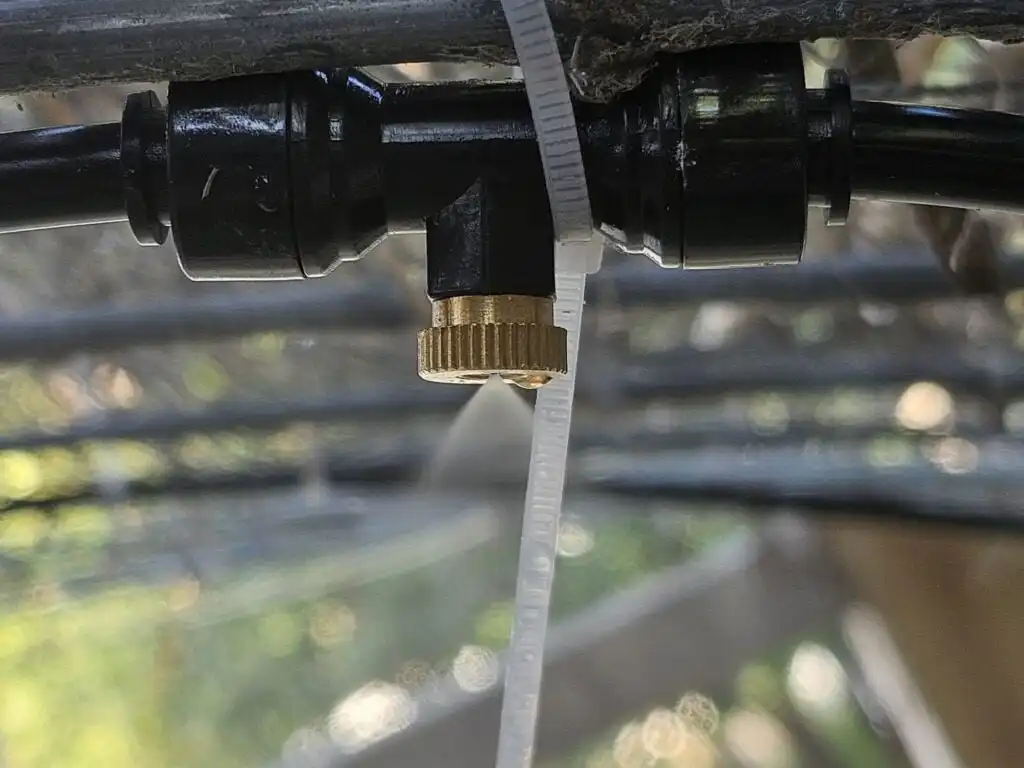
Engage with Us!
How do you keep your ducks cool during the summer? Have any special tips or tricks? Share your experiences in the comments below – we love hearing from our duck-loving community!
Keeping our ducks cool and comfortable in the summer is all about a combination of shade, water, and a little extra TLC. With these tips, you can ensure your ducks stay happy and healthy all season long. Happy duck keeping, and stay cool!
